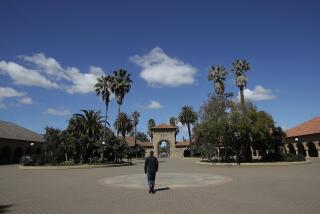Rejected by Stanford? You’ll live
THIS AFTERNOON, my office will send out nearly 18,000 e-mail messages to high school seniors who are waiting with anticipation to learn whether they will be invited to spend the next four years at Stanford.
While I have been in the admissions field for more than 25 years, I expect to be feeling quite a bit of pain at the end of this week (as I do each year) about the many exceptional youths who did not get offered one of the roughly 1,650 slots in the Class of 2011. I also expect that, in the following weeks, I will hear from parents who are understandably distraught that their sons and daughters with top high school class rankings, perfect 800 SAT scores and some truly impressive extracurricular accomplishments were denied entry.
Clearly, I believe that a Stanford education is wonderful, but my experience suggests it’s often parents who are more upset about our admission decisions than the kids. I can relate to their concerns: I find myself getting jittery as my daughter waits to hear from the colleges she’s applied to this year. But given that today’s teens already have enough pressure in their lives, I wish to impart three credos to these parents.
First, it’s all relative. While the number admitted into the undergraduate class has remained unchanged for years, Stanford, like many of its peer schools, has had a record number of applicants -- nearly 24,000. Regardless of arguments over whether too much preference is given to one category over another, thousands of students are going to be turned away, and there is no doubt that the vast majority of them could have met the demands of a Stanford education. We could, for instance, have filled the incoming class four times over with applicants who achieved grade point averages of 4.0 or greater.
I wish there were a formula to explain who is accepted and who isn’t, but the decision-making is as much art as it is science. Each class is a symphony with its own distinct composition and sound; the final roster is an effort to create harmony, and that means that some extraordinary bass players don’t get a chair. What’s more, even among my staff there are legitimate differences about applicants. The bottom line: The world is not going to judge anyone negatively because they didn’t get into Stanford or one of our peer institutions.
Second, celebrate the bigger picture. Despite the constant media buzz about the turbulent state of youth today, most of the applications I reviewed -- as well as those reviewed by my colleagues at Stanford and elsewhere -- are truly remarkable. And in most cases, those denied admission to some schools are admitted to others. The transition from high school to college is a monumental turning point, and it’s more important to focus on how a young adult is moving on to a new stage than where that stage happens to be. This is the moment when parents should mark the success of their children and rejoice in the excitement that the next four years will bring.
And that leads to my final point: Education is what a student makes of it. Of course, certain schools have resources that others don’t, but they all offer opportunities to learn and to grow.
I am reminded of a teenager graduating high school in Sunnyvale, Calif., in 1975, who applied to only Stanford and one other school. He was understandably disappointed when denied admission here, but he later excelled as an undergraduate at the distinguished university across San Francisco Bay, UC Berkeley. He went on to earn a doctorate at the Massachusetts Institute of Technology and to become a research scientist at the Carnegie Institution of Washington and an adjunct professor at Johns Hopkins. In 2003, he joined the Stanford University School of Medicine and last year was the co-winner of the Nobel Prize in physiology or medicine.
Andrew Fire is not atypical when it comes to Stanford applicants. Nor for that matter is John Etchemendy, the Stanford provost and philosophy professor who also was denied admission as an undergraduate. Nor are any of the thousands of others who aren’t accepted into Stanford and go on to have fulfilling lives.
An undergraduate degree from Stanford, or an Ivy League college, may well end up being only one line at the bottom of a resume. What parents of college applicants across the country need to remember this week is that the news their children are about to receive, whether good or bad, is but a single step on a much longer journey.






